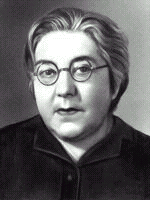presents
 Shaginyan, Marietta Sergeevna.
Born 2 April 1888 (21 March, Old Style) in Moscow, in the family of a doctor. She attended the Rzhevskaya Gymnasium, one of the best in Moscow at the time. At age 15, she began writing for newspapers, and her first volume of poetry First Encounters (Perviye vstrechi) was published in 1909. In 1912 she graduated from a woman's college, specializing in history and philosophy.
Shaginyan, Marietta Sergeevna.
Born 2 April 1888 (21 March, Old Style) in Moscow, in the family of a doctor. She attended the Rzhevskaya Gymnasium, one of the best in Moscow at the time. At age 15, she began writing for newspapers, and her first volume of poetry First Encounters (Perviye vstrechi) was published in 1909. In 1912 she graduated from a woman's college, specializing in history and philosophy. In 1912 she visited Petersburg where she met and became acquainted with Gippius and Merezhkovsky. She fell under the influence of Symbolism and wrote O blazhenstve imushchevo. Poeziya Z.N. Gippius. Fame came to Shaginyan in 1913 with publication of her book of poetry, Orientallia. She worked as a journalist, specializing in literary and artistic topics for papers such as Priazovky krai, Kavkazskoye slovo, and Baku. In 1914 she took a journey to Weimer and produced Journey to Weimar, a cycle of metaphysical and philosophical verse plays. Between 1915 and 1918, Shaginyan lived in Rostov-on-Don, teaching aesthetics and the history of art. In the 1920s, Shaginyan produced several works of fiction, including the anti-Freudian novel One's Own Fate (Svoya sud'ba, 1923) and the eclectic novel K and K (KIK, 1929), which combines a medley of genres from poem to report in relating the story of a missing Soviet commissar told from four different points of view by four different (fictional) authors. The Civil War on the Don and its new society are reflected in the novel Change (Peremena), the povest Adventures of a Society Lady (Prikliucheniya damy is obshchestva), and the short story Agitation Train (Agitvagon). Proving she had a sense of humor, Shaginyan also wrote Mess Mend, or a Yankee in Petrograd, an amusing spy thriller, comedy, and science fiction novel all rolled into one. Western capitalists and members of the deposed nobility plot to assassinate Lenin and the entire Soviet government. But they are foiled by a secret American workers organization, the Soviet government, and nature itself, which afflicts the deposed princes, capitalists, etc., with a bizarre degenerative disease, literally turning them into beasts. Shaginayan's Hydrocentral (Gydrotsentral', 1931) was one of the first novels on industrialization and creative socialist labor. In 1942, Shaginyan became a member of the Communist Party. In 1945 she completed work to receive a doctorate degree in philology. An investigative reporter as well as artist, Shaginyan spent four years in the mountain villages of Armenia, the result of which was her Journey Through Soviet Armenia (1950). This work was awarded the State Prize in 1951. She produced a historical novel on the Czech composer Josef Myslivecek, Resurrection From the Dead (Voskresheniye iz mertvikh, 1964). During her research on this novel, she uncovered two lost operas. In 1972, Shaginyan won the Lenin Prize for her historical novels on Lenin: Ulyanov Family (Sem'ya Ulyanovykh, 1938 - 1957) and First All-Russian (Pervaya Vserossiiskaya, 1965). She also penned a series of essays on Lenin published under the title of Four Lessons with Lenin (Chetyre uroka u Lenina, 1970). A book of her reminiscences, Man and Time (Chelovek i vremya), was published in 1980. During her lifetime, Shaginyan also wrote literary portraits of authors that she had known or loved, including Tikhonov, Khodasevich, Rachmaninov, Shevchenko, Krylov, and Goethe. Marietta Shaginyan died in Moscow 1982. Source: "Handbook of Russian Literature", edited by Victor Terras. Yale University Press. 1985. |